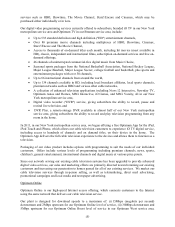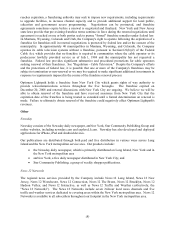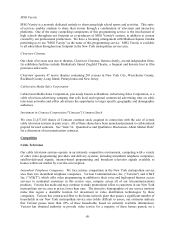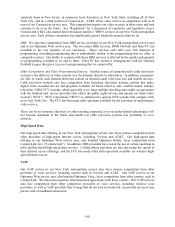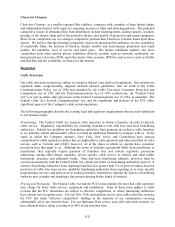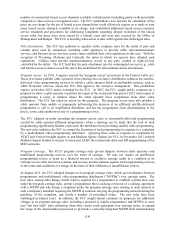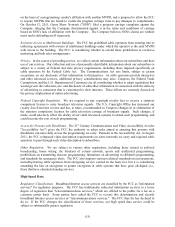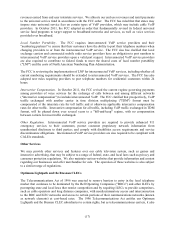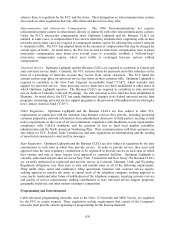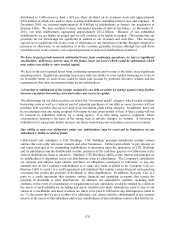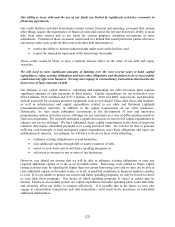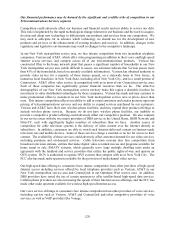Cablevision 2011 Annual Report Download - page 19
Download and view the complete annual report
Please find page 19 of the 2011 Cablevision annual report below. You can navigate through the pages in the report by either clicking on the pages listed below, or by using the keyword search tool below to find specific information within the annual report.(13)
In addition, in areas not subject to effective competition, the Federal Cable Act and the FCC's rules also
require us to establish a "basic service" package consisting, at a minimum, of all local broadcast signals
that we carry, as well as, if the locality requests, all public, educational and governmental access
programming carried by our systems. All subscribers are required to purchase this tier as a condition of
gaining access to any other programming that we provide. From time to time, Congress or the FCC
consider imposing new pricing or packaging regulations, including proposals requiring cable operators to
offer programming services on an unbundled basis rather than as part of a tier or to provide a greater array
of tiers to give subscribers the option of purchasing a more limited number of programming services.
Must-Carry/Retransmission Consent. Cable operators are required by the "must carry" provisions of
federal law to carry, without compensation, the programming transmitted by most local broadcast
stations. Additionally, FCC rules require that we simulcast must-carry stations in analog as long as we
carry any programming in analog on our system. Those rules expire on June 12, 2012 unless extended.
Alternatively, local television stations may elect retransmission consent. Stations making such an
election give up their must-carry right and negotiate with cable systems the terms on which the cable
systems carry their stations. Cable systems generally may not carry a broadcast station that has elected
retransmission consent without the station's consent. The terms of retransmission consent agreements
frequently include the payment of compensation to the station. A substantial number of local broadcast
stations currently carried by our cable television systems have elected to negotiate for retransmission
consent. While we currently have retransmission consent agreements with all such broadcast stations, the
potential remains for carriage of such stations to be discontinued if any of such agreements is not renewed
following its expiration.
In the wake of publicized disputes between several cable operators and broadcasters, several members of
Congress have expressed concern that current retransmission consent requirements and practices have had
a negative effect on consumers, and stated that it is time for Congress to reexamine those requirements.
Other members of Congress have suggested that binding arbitration may be an appropriate means of
resolving such disputes. The FCC has initiated a proceeding to consider changes to its rules governing
retransmission consent negotiations.
Ownership Limitations. Congress has required the FCC to set a national limit on the number of
subscribers a cable company can serve, and a limit on the number of channels on a cable television
system that can be occupied by video programming services in which the operator of that system has an
attributable interest. The FCC established a national limit of 30% on the number of multichannel video
households that a single cable operator can serve, but that limit was invalidated by a federal court in
August 2009 and the FCC has not yet established a new limit. The FCC also created a limit of 40% on
the number of channels on a cable television system that can be occupied by video programming services
in which the operator of that system has an attributable interest, but that rule was invalidated by a federal
court in 2001 and the FCC has not yet established a new limit.
Set Top Boxes. The FCC requires cable operators to allow consumers to connect televisions and other
consumer electronics equipment with a slot for a security card directly to digital cable television systems
to enable receipt of one-way digital programming without need for a set-top box. The FCC also requires
cable operators to separate security from non-security functions in new digital set-top boxes deployed on
or after July 1, 2007, to permit the manufacture and sale of these devices by third parties. We meet this
requirement by providing set top boxes with separable security. Additionally, the FCC has an ongoing
proceeding to examine whether it should take further steps to promote a retail market for cable service
navigation devices, including requirements to facilitate access to Internet-based video offerings via
subscribers' television sets, which may entail further mandates in connection with the support and
deployment of set top boxes.
PEG and Leased Access. Localities may require free access to public, educational or governmental
("PEG") channels on our systems. In addition to providing PEG channels, we must make a limited




